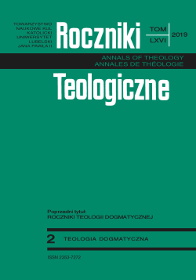Teologiczne rozumienie małżeństwa osób ochrzczonych a niewierzących
Theological Understanding of Marriage Baptized and Non-believers
Author(s): Krzysztof GóźdźSubject(s): Christian Theology and Religion, Theology and Religion, Systematic Theology
Published by: Towarzystwo Naukowe KUL & Katolicki Uniwersytet Lubelski Jana Pawła II
Keywords: natural marriage; christian marriage; marriage of baptized and non-believers; faith and sacrament; sacramentality of marriage; faith and disbelief
Summary/Abstract: Marriage is a divine plan, because it derives from God's power of creation and is expressed in two fundamental motives of creation: giving life and love (cf. Gen 2:7; 1:27; 2:18). This is how the married couple builds communio personarum, an indivisible “one body”, which on earth takes part in God's act of continua creatio. In other words, God created man in his image and likeness as “one body” of two persons, who actuate His love and His power to create (creation; offspring). And although the first Edenic marriage failed, in their offspring, the motif of the creative bond between the created and the love of God-creator perseveres. God's act of natural creation constitutes the deepest foundation of marriage, and as a sacrament, it constitutes a salvation act accomplished by Christ. Thus, Christ elevated the natural marriage to the dignity of a sacrament.Contemporary Christians enter into marriage, even though there is a growing tendency among them to disbelieve in what the Church does (intention), or to declare a complete rejection of faith. We define these persons as baptized non-believers. However, through their unbelief they are not deprived of their link with the creative power of God and His love. The sacramental status of their marriage continues by virtue of their baptism and by the sacramental dispensation of grace ex opere operato. The personal faith of the married couple cannot waive the sacramental status of marriage, even though it can affect its fruitfulness. Also, the required nupturient intent − the intention to do what the Church does − which is the minimum necessary condition for entering into a sacramental union, is born of faith, and the lack of personal faith may thus affect the validity of the sacrament. Therefore, baptized non-believers who marry without personal faith and without the intention of doing what the Church does, do not conclude a purely natural marriage. “For the Church, between the two baptized, there is no natural marriage separate from the sacrament, but only a natural marriage elevated to the dignity of a sacrament.” (International Theological Commission, Catholic Doctrine on the Sacrament of Marriage, p. 98). Thus the Church conditions the spiritual life of all Her members, unites them into one organic whole, leads them to fulfilment and personalization as much as possible, so that all Christians are one in Christ Jesus (cf. Gal 3:28).Therefore, the baptized who are no longer believers can have a sacramental, inseparable marriage in the Catholic Church, which also makes amends for the shortcomings of their faith (Ecclesia suplet). Although the lack of living personal faith deprives marriage of its sacramental fruit, it does not exclude the couple from the Church − which they entered by virtue of baptism. Another reason for non-exclusion is the fact that marriage as such is a manifestation of God's will (cf. Gen 1:27; 2:24).
Journal: Roczniki Teologiczne
- Issue Year: 66/2019
- Issue No: 2
- Page Range: 19-34
- Page Count: 16
- Language: Polish

